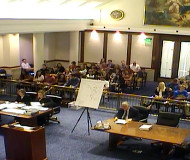9/21/2017
Iowa Supreme Court Hears Speed Camera Due Process ComplaintsOral arguments in Iowa Supreme Court case bring out dispute over the potential violation of the due process rights of motorists.

Do speed cameras violate a driver's right to equal protection of the laws? The Iowa Supreme Court took up the question on Wednesday, weighing whether the city of Cedar Rapids set up an unlawful system to adjudicate disputes over the automated tickets issued to motorists passing through on Interstate 380 and six intersection locations within the city.
The issue drawing the most interest from the justices was whether the city could get away with not giving automated tickets to drivers of commercial vehicles, government cars and people with temporary tags.
"My point is, ok, fine, then you have to articulate a reason," Justice Brent R. Appel said. "People might look at this and say, 'Well, the trucking industry is a powerful force in Cedar Rapids, and government insiders and powerful forces ended up crafting an ordinance that hits citizens but does not gore the ox of powerful public and private interests."
Lawyers for the city said they did not ticket the semi trucks because they cannot retrieve the information from the NLETS database without photographing the front of vehicles, which would not be "cost effective." Justice David S. Wiggins pointed out that cameras in Arizona and California do photograph the front of the vehicle and attempt to make a positive identification of the actual driver.
James C. Larew, the attorney for motorists who received tickets, insisted that cost cannot be used as an argument to deny the constitutionally protected right to due process. He pointed out that the contract between the city and Gatso, the Swedish company that runs every aspect of the program, answers the cost question quite clearly.
"Gatso bears the cost of administration," Larew explained. "It's a contingency fee contract... That fee is based on the amount of money collected. These costs are to be absorbed by Gatso. I think a reasonable interpretation of this regime is that it might be intended to save Gatso some money. Where's the public interest in this?"
The court also saw problems with the administrative hearings set up by the Cedar Rapids ordinance. Larew pointed out it was very likely that Gatso had a hand in writing the procedures to contest a violation notice.
"There's a real incentive here for out-of-state corporations with a turnkey operation and a promise of cash flow to [entice] cities that look at themselves as cash strapped... causing there to be a skimming when it comes to the full protection of citizen rights," Larew said. "If we didn't have rights, there'd be less expense, but we would have a less reasonable place and a less enjoyable place to govern ourselves as free citizens."
The justices accepted the case and are expected to rule on it in the months ahead. In a 2008 high court camera case, Justice Appel championed automated ticketing while Justice Wiggins led the dissent (view ruling).


